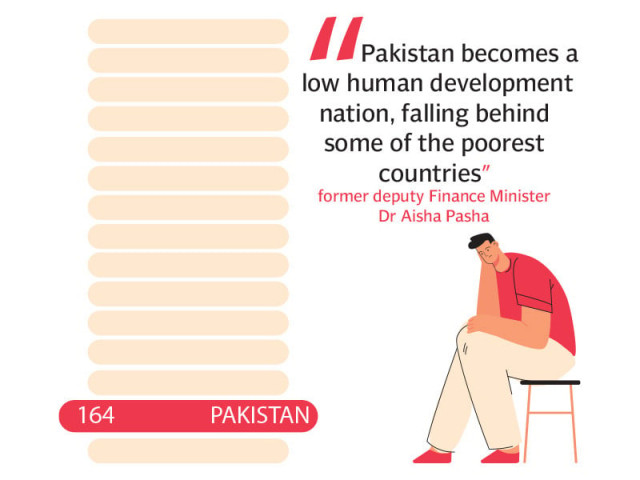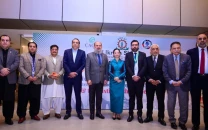Human development crisis deepens
Pakistan falls below Haiti, experts warn of catastrophe amid rising debt

As Pakistan becomes a low human development nation, falling behind some of the poorest countries, former Deputy Finance Minister Dr Aisha Pasha said on Thursday that deepening the debt trap would unleash further human catastrophe.
Her remarks came during a Pakistan Economists Round Table seminar organised by the World Bank to highlight the findings of the latest Human Development Report 2023-24.
Pakistan has become the poorest income country with a low human development rating of 164, said Samuel Rizk, the Resident Representative of the United Nations Development Programme (UNDP) in Pakistan.
The Human Development Report 2023-24 showed that countries like Haiti and Zimbabwe were ranked higher than Pakistan. The countries standing between 119 to 160 are categorised as medium human development nations. Pakistan is in the bottom group with a low ranking of 164.
“The federal government is in a debt trap and does not have any resources left to spend on human development,” said Pasha, former Minister of State for Finance in the Pakistan Democratic Movement (PDM) government. She mentioned that after paying for the provincial shares under the National Finance Commission award, the remaining money is not sufficient to pay the interest cost on the debt. “I foresee further catastrophe in the human development index, and food insecurity is on the rise,” she added.
There has been inefficient use of allocated resources, she noted. She highlighted the need to cut back on subsidies that are not benefiting low-income groups. “The poor people have borne the brunt of economic reforms in the past two years, which has to be stopped. It is high time that the elites now take a hit,” said the former finance minister.
The seminar was held two days after the World Bank report stated that over 10 million more people were at risk of slipping into poverty due to the combination of low economic growth and high inflation. Dr Pasha remarked that the World Bank and International Monetary Fund (IMF) projections about poverty and low economic growth are accurate. She stated that Pakistan cannot attain even a 5 to 6% economic growth rate in the near future.
The World Bank described the deteriorating human development situation in Pakistan as a “silent, deep human capital crisis.” Pakistan’s neighbours are even performing better, as the country’s inequality-adjusted human development index is also worsening, said Samuel Rizk. He added that the country’s performance on the gender inequality index and multidimensional poverty were also poor.
Prime Minister Shehbaz Sharif said on Thursday that the country needed another IMF programme, but its conditions would be very tough. Despite Pakistan’s descent from a middle to a low human development country, it lacks financial resources to spend in the right areas, said Dr Pasha.
The UNDP’s human development index measures achievement in three aspects of human development: a long and healthy life, access to education, and a reasonable standard of living. Pakistan performed poorly and is now standing with the world’s poorest nations.
Dr Asad Sayeed, the Senior Research Associate at Collective for Social Science Research, said that Pakistan was in the midst of the debt crisis driven by external debt repayments. Pakistan is facing a growing human development crisis, with most indicators of literacy, education, health, poverty, and other aspects of human welfare deteriorating in recent years.
“No member of the provincial or national assembly has lost an election because he did not provide education in his constituency,” said Dr Kaiser Bengali, the renowned economist.
Rizk stated that globally, there has been recovery in the human development index to pre-COVID levels, but inequality has been expanding. He mentioned that the impacts of the Palestine war, which he called the Gaza war, and other critical developments would be known in the next human development report.
“Pakistan was the first country to have a National Assembly resolution committing to the Sustainable Development Goals (SDGs), but now it is terribly off track on implementing these SDGs,” said Dr Maleeha Lodhi, Pakistan’s former ambassador to the UN and the United States.
Published in The Express Tribune, April 5th, 2024.
Like Business on Facebook, follow @TribuneBiz on Twitter to stay informed and join in the conversation.



















COMMENTS
Comments are moderated and generally will be posted if they are on-topic and not abusive.
For more information, please see our Comments FAQ